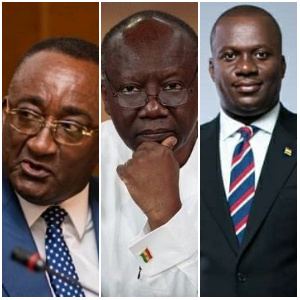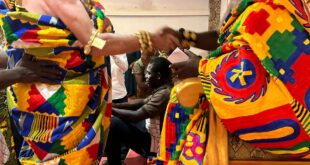Section 13 of the Civil Service Act 1993 (PNDCL 327) outlines the duties of a ministry as: “A Ministry shall Initiate and formulate policies, taking into account the needs and aspirations of the people; undertake development planning in consultation with the National Development Planning Commission; and co-ordinate, monitor and evaluate the efficiency and effectiveness of the performance of the Sector.”
By this, whoever occupies the office of the sector minister has a duty to uphold these responsibilities as cautiously as possible. And it is the same reason everything going well or wrong in the ministries are either celebrated with them as the focus or blamed on them.
Ghana has been going through a phase of many challenges lately, and as many of the country’s leaders have argued, it is not a thing akin to the Ghana, but universally, economies are struggling.
The excuses of the novel Coronavirus that hit the world massively in 2020 and beyond, and the Russia-Ukraine war that started at the beginning of 2022, have been made several times.
And while many experts and politicians outside the current government believe otherwise, there is no denying the fact too that there are some ministers whose heads the axe of ‘failures’ fall on harder.
In this article, GhanaWeb puts its radar on the ministers in charge of some sectors that have been largely troubled in the recent years, considering the struggles their areas have been facing, as well as how much the citizenry have been affected.
Cedi Depreciation and Ken Ofori-Atta:
The Ghana cedi has been on a free fall in the last months at a rate that many experts have even come to admit they were wrong at making projections on.
At the beginning of January 2022, the cedi was trading at a rate of GH¢5.9 to the US dollar, according to data from the Bank of Ghana.
But it shortly depreciated to GH¢6.02 at the inter-bank level, indicating a depreciation of nearly 12 percent – a signal which sparked the current performance of the cedi.
The government, led by Ken Ofori-Atta, the Minister of Finance, in presenting the 2022 budget, had hoped to pass a number of key policies to boost the country’s domestic revenue but that hit a snag as debate over the passage of the E-Levy rocked parliament.
In March 2022, the Ghana Cedi continued its free fall against the US dollar, crossing the GH¢8 mark and selling at GH¢8.12 as of the 15th of the month.
The local currency at the time was trading against the dollar at a buying price of GH¢7.94, while the British pound was selling at GH¢10.17 and buying at GH¢10.17.
As of Monday September 5, 2022, some forex bureaus in Accra were selling $1 for GH¢10.12 and buying it at GH¢9.90.
And as of September 27, the Minister of Finance, Ken Ofori-Atta, said the cedi had lost its value by about 31.7 percent to the US dollar.
Despite the assurance from the government that measures were being adopted to address the cedi’s performance, the dollar hit the unprecedented GH¢11 to $1 mark at some forex bureaus in the country.
As of October 8, 2022, checks by GhanaWeb Business showed that the cedi was selling at GH¢11.2 to $1 dollar. This has now renewed further concerns over the demand and supply of US dollars which now seems to be scarce in circulation.
Galamsey and Samuel Abu Jinapor:
Matters of the environment and the destructions that have been caused to it have not been as prominent as they have been in the last few years, especially as the Government of Ghana, led by President Nana Addo Dankwa Akufo-Addo, tries to end the illegal small mining trade in many parts of the country.
Galamsey, as it is widely known, has become a matter of great concern for many, with traditional rulers, politicians, social groups and nearly every Ghanaian making it a point to contribute to discussions or calls for the menace to be stopped.
The infiltration of foreigners, especially Chinese nationals, in the illegal trade, with the use of their heavy equipment, have further escalated the destructions of the mining activities on the environment.
The sector minister under whom all of these have been happening is the Minister of Lands and Natural resources, Samuel Abu Jinapor.
In 2021, during a Regional Consultative Dialogue on Small Scale Mining at the KNUST in the Ashanti Region, Otumfuo Osei Tutu II noted, before delving into issues as captured in his speech, that the minister and another government official tried to convince him to stick to the script.
This he said, was perhaps resultant of some foreseen comments he may have made which may affect some parties affected or involved in the galamsey menace.
“Before I read my speech, I want to make mention of some two things. Yesterday, the Regional Minister and my son, Jinapor, came to me to tell me to stick to the content of the speech and I told them I would. They perhaps thought I may say something else that may bring some trouble.
“In all sincerity, I told them that this galamsey issue we’ve been talking about, about 30% of us in this gathering would know the persons involved in galamsey. If we don’t speak the truth, we will keep deceiving ourselves, keep doing conferences for a long time,” he stated.
He noted with worry how some affluent persons are using their positions to promote the disturbing practice, a thing he emphasized must stop if the fight against galamsey will work.
“Right here, one of the culprits involved in galamsey confessed that the Chiefs gave them the land. If you are a chief and you know you are giving out lands for galamsey, you should judge yourself and ask if you are doing the right thing. If you go to your village and you have given out that land for galamsey, what leadership example are you giving?. It’s wrong.
“Yesterday, they came and mentioned a lot of things which will probably stir up trouble if I should touch on them,” he added.
Samuel Abu Jinapor has since been working out a number of initiatives and plans to see how, together with other state actors, they can bring an end to the galamsey menace.
Food Shortage and Owusu Afriyie Akoto:
The Minister of Food and Agriculture, Owusu Afriyie Akoto, has come under a lot of backlash for not doing much to ensure that Ghana, a country with arable lands and great prospects to becoming a food basket for the West African sub-region and even Africa, has rather been food starved.
For instance, a World Bank report revealed that Ghana leads in countries with the highest food prices in Sub-Saharan Africa since January 2022.
Food prices, according to the World Bank’s October 2022 Africa Pulse Report, have been on the rise since January 2022 by 122%.
The report noted that Ghana has experienced very rapid food price increases this year, breaching the “inflation ceiling of the central bank target bands for all countries with an explicit nominal anchor.”
Ghana’s inflation has been largely influenced by food, transportation, and fuel.
According to the Ghana Statistical Service, the country’s current inflation rate stands at an all-time high of 33.9% as of August 2022, with food inflation alone at 34.4%, higher than the national average.
The drivers of food inflation in Ghana are Oils and Fats (67%); Fish and Other Seafood (42.9%); Water (42%); Cereal products (40%); Milk, Diary Products, and Eggs (39.7%), Fruits and Vegetable Juices (37.7%) and Live Animals and Meat (34.5%). All of the items recorded inflation rates higher than the national average of 33.9%, an earlier GhanaWeb report stated.
There is surely a lot that is expected from the sector minister, Owusu Afriyie Akoto, also too because there have been several instances where secondary schools around the country have been faced with massive food shortages.
In some cases, schools threatened to close down because of the extent of the shortage of food they were experiencing.
Source: www.ghanaweb.com
 Home Of Ghana News Ghana News, Entertainment And More
Home Of Ghana News Ghana News, Entertainment And More





